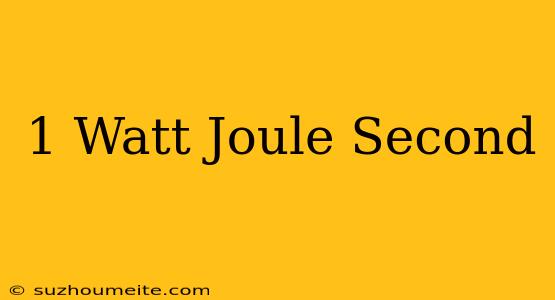1 Watt = Joule/Second: Understanding the Unit of Power
Introduction
In the world of physics, understanding the units of measurement is crucial to grasp the underlying concepts. One of the most fundamental units of measurement is the watt, which represents power. But have you ever wondered what 1 watt really means? In this article, we'll delve into the meaning of 1 watt and its equivalent in terms of joules per second.
What is a Watt?
A watt (W) is the unit of power, which is the rate at which energy is transferred or converted. In other words, it measures the amount of energy consumed or produced per unit of time. The watt is named after James Watt, a Scottish engineer who improved the efficiency of steam engines in the 18th century.
The Joule-Second Connection
Now, let's talk about the connection between watts and joules per second. A joule (J) is a unit of energy, which is defined as the work required to apply a force of 1 newton over a distance of 1 meter. When we say 1 watt, it means that 1 joule of energy is transferred or converted in 1 second.
Mathematically, this can be represented as:
1 W = 1 J/s
In other words, 1 watt is equivalent to 1 joule per second. This means that if a device consumes 1 watt of power, it is using 1 joule of energy every second.
Practical Applications
Understanding the watt-joule connection has significant practical implications. For instance, when you charge your smartphone, you're consuming a certain amount of energy (joules) over a period of time (seconds). The rate at which you consume this energy is measured in watts.
Similarly, when you drive an electric vehicle, the motor uses electrical energy (joules) to propel the vehicle forward. The rate at which this energy is consumed is measured in watts, which determines the vehicle's performance and efficiency.
Conclusion
In conclusion, 1 watt is equivalent to 1 joule per second, representing the rate at which energy is transferred or converted. This fundamental concept is essential in understanding various aspects of physics, engineering, and everyday life. By grasping the watt-joule connection, we can better appreciate the intricacies of energy consumption and production.
